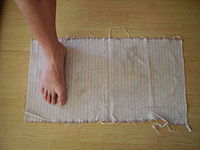Onuce | Foot Wrappings | |
1 | Nic tak nie śmierdzi jak moje onuce | Nothing stinks so much as do my foot wrappings |
Od roku już nie zmieniane | Which I’ve not changed since last year | |
Jak się służba skończy | When I do my service | |
Do domu wrócę | I’ll go back home | |
5 | Spać się położę na sianie | And go to sleep in the hay |
Nic tak nie śmierdzi… | Nothing stinks so much… | |
Jak mnie nie zechcesz | If you reject me | |
To cię porzucę | I'll gonna leave you | |
I znów żołnierzem zostanę | And join the army again | |
10 | Nic tak nie śmierdzi… | Nothing stinks so much… |
Pisać nie umiem | I can’t write yet | |
Lecz się nauczę | But I'll soon learn | |
I list ode mnie dostaniesz | And send you a letter | |
Nic tak nie śmierdzi… | Nothing stinks so much… | |
15 | Siostrze się nie dam | Won’t let my sister |
Poświęcić nauce | Devote me to science | |
Lecz sam docentem zostanę | I’ll get some chair by myself | |
Nic tak nie śmierdzi… | Nothing stinks so much… | |
Choremu ojcu | As for my sick dad | |
20 | Cierpienia skrócę | To ease his pain fast |
W łeb go pierdolnę polanem | I’ll whack the fucker with a log | |
Nic tak nie śmierdzi… | Nothing stinks so much… | |
A znów jeden kolega | And there’s that mate of ours | |
Jest najmilszy w grupie | Who’s the most kind | |
25 | Gdyż nogi ma amputowane | ‘Couse he had his legs amputated |
Nic tak nie śmierdzi… | Nothing stinks so much… | |
Jak mnie zabiją | And if I get killed | |
Płakać nie musisz | Don’t cry for me | |
Smród zawsze po mnie zostanie | The stench'll remain when I’m gone | |
30 | Nic tak nie śmierdzi… | Nothing stinks so much… |
Zembaty’s ‘Foot Wrappings’ is the most famous parody of soldiers’ songs, which were very popular in Poland during the Polish People’s Republic’s period. Choice of this author at this time seems obvious not only because I was considering to translate some of his songs, but also because of the fact that Maciej Zembaty passed away only a few days ago due to a cardiac arrest.
The aforementioned soldiers’ songs were so popular and popularized by the communist authorities in Poland that even soldiers’ songs’ festivals were organized. They were one of the characteristics of Polish People’s Republic. As far as I can remember, the songs in questions were rather schematic and of little content. They used to extol the wonderfulness of soldier’s life by means of simple and repeated motifs like the oath ceremony or a girl waiting for the soldier to come back from the army.
Zembaty in ‘Foot Wrappings’ exploits these motifs but in a parodic manner. The main theme of the song does not refer to soldiers’ adventures or ups and downs of soldier’s life, but to a thing well-known by soldiers at that time and of rather dishonourable nature. But Zembaty carried the theme of foot wrappings to the extremes since he not only drew attention to soldier’s foot wrappings, but also to their stench, raising by the way the question of soldiers’ hygiene.
Of course, this is not the only instance when the image of the Polish soldier is being damaged. The soldier in Zembaty’s song swears, cannot write, prefers to kill his sick father. In the mention of amputated legs, there is also black humour for which Maciej Zembaty was so famous.
Translation
Verse 1 – Literary: ‘Nothing stinks as my foot wrappings do’.
Verse 17 – Literary: ‘but I become an associate professor/a reader by myself’. ‘Docent’ was the name of a post in Polish universities used till the end of the 80s and the beginning of the 90s. Later it was changed for an assistant lecturer (‘asystent’).
Verse 21 – In the original, there is actually no word meaning ‘fucker’, but the Polish verb ‘pierdolnąć’ seems to be more vulgar than the English ‘whack’.

